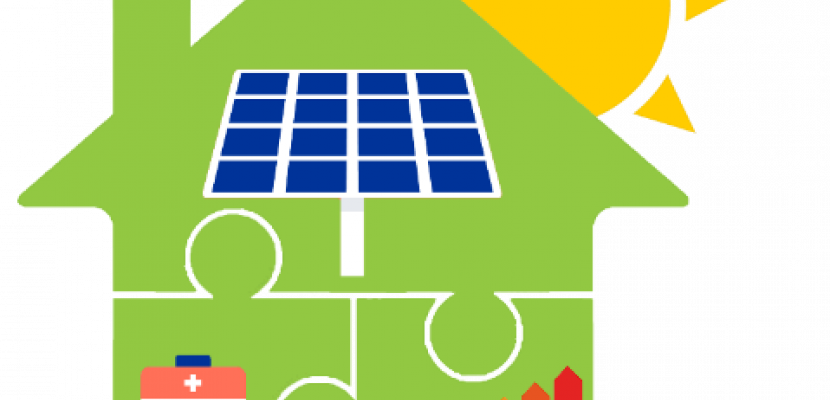Image

Facilitation of renewable energy solution for self-consumption in residential buildings
Published on 16 February 2021

Bulgaria
Yuzhen tsentralen
This is the good practice's implementation level. It can be national, regional or local.
About this good practice
Rising energy prices are exacerbating energy poverty, especially in South-Eastern Europe. The seriousness and depth of the problem and the need to protect energy vulnerable consumers requires the implementation of new renewable technology solutions. Transition from large energy systems to decentralized renewable generation is also needed. One of the most promising renewable solutions for alleviating energy poverty is PVs, as it provides competitive renewable power for self-consumption.
However, high PV penetration levels in certain areas may result in un-acceptable stresses on the electrical grids during hours with high solar power generation, which could limit their further expansion in specific areas with high concentration of vulnerable consumers and PV generation assets.
As the number of PVs increases their integration in the distribution grids will be very difficult, unless Battery Energy Storage Systems (BESS) is implemented.
The project tested the implementation of the hybrid PV and BESS as a mean to increase the renewable self-consumption and self-sufficiency within 5 residential buildings. A total of 13.5 kWp + 48 kWh storage capacity is implemented within 5 prosumers in Plovdiv area, each one consisted of: 2.70 kWp PV panels + 9.6kWh LiFePO4 ESS + 5kW hybrid inverter.
In countries with high solar potential coupled with the decreasing costs of PV and BESS, makes such hybrids a viable, cost-effective and attractive solution for energy poverty alleviation.
However, high PV penetration levels in certain areas may result in un-acceptable stresses on the electrical grids during hours with high solar power generation, which could limit their further expansion in specific areas with high concentration of vulnerable consumers and PV generation assets.
As the number of PVs increases their integration in the distribution grids will be very difficult, unless Battery Energy Storage Systems (BESS) is implemented.
The project tested the implementation of the hybrid PV and BESS as a mean to increase the renewable self-consumption and self-sufficiency within 5 residential buildings. A total of 13.5 kWp + 48 kWh storage capacity is implemented within 5 prosumers in Plovdiv area, each one consisted of: 2.70 kWp PV panels + 9.6kWh LiFePO4 ESS + 5kW hybrid inverter.
In countries with high solar potential coupled with the decreasing costs of PV and BESS, makes such hybrids a viable, cost-effective and attractive solution for energy poverty alleviation.
Resources needed
A PV+BESS hybrid achieving nearly 80 % of self-consumption ratio is estimated in the price range between 9,500 to 11,500€ per pilot. Human resources costs are up to 15 % of the total costs.
Evidence of success
Data from monitoring activities showed that:
- Pilots with no electricity heating demand managed to cover 80% of their annual power due to the PV+BESS hybrid, while in the case of no BESS just 48%.
- Pilots with electricity heating demand are able to cover 60% of their annual demand, while with no BESS just 38%.
On average each household achieved:
- The emissions CO2 avoided: 2.8 ton/year
- The energy savings achieved: 3.4 MWh/year
- Financial savings of 390 €/year
- Pilots with no electricity heating demand managed to cover 80% of their annual power due to the PV+BESS hybrid, while in the case of no BESS just 48%.
- Pilots with electricity heating demand are able to cover 60% of their annual demand, while with no BESS just 38%.
On average each household achieved:
- The emissions CO2 avoided: 2.8 ton/year
- The energy savings achieved: 3.4 MWh/year
- Financial savings of 390 €/year
Potential for learning or transfer
Given the expected abolition of Feed-in Tariffs аnd Net-Metering schemes in the EU by 2023, the described project provided data on the efficiency from the implementation of an innovative hybrid of PV plus Battery Energy Storage System. The hybrid targeted to maximise the self-consumption of PV production in 5 single household buildings, as a possible solution for them to achieve power neutrality. Data was collected to test and validate to which extend the ratio of renewable self-consumption and self-sufficiency could be achieved. Pilots with no electricity heating demand covered 80% of their annual power consumption. Hence, this type of solution has multi benefits applicable to low income households. BESS can also have many other applications in a power network, such as power balancing and frequency regulation through the provision of ancillary services. PV+BESS maximises profit and self-sufficiency, while reducing energy poverty and achieving improved access to the energy market.
Further information
Website
Good practice owner
You can contact the good practice owner below for more detailed information.
Organisation
Energy Agency of Plovdiv

Bulgaria
Yuzhen tsentralen
Contact
Sustainable energy expert
